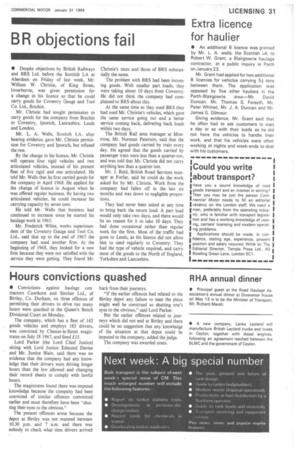BR objections fail
Page 33

If you've noticed an error in this article please click here to report it so we can fix it.
• Despite objections by British Railways and BRS Ltd. before the Scottish LA at Aberdeen on Friday of last week, Mr. William W. Christie, of King Street, Inverbervie, was given permission for a change in his licence so that he could carry goods for Coventry Gauge and Tool Co. Ltd., Brechin.
Mr. Christie had sought permission to carry goods for the company from Brechin to Coventry, Ipswich, Lancashire, Leeds and London.
Mr. L. A. Wells, Scottish LA, after hearing evidence, gave Mr. Christie permission for Coventry and Ipswich, but refused the rest.
By the change in his licence, Mr. Christie will operate four rigid vehicles and two articulated vehicles, instead of his present fleet of five rigid and one articulated. He told Mr. Wells that he first carried goods for the company in April 1968. He applied for the change of licence in August when he was offered regular business. By having two articulated vehicles, he could increase his carrying capacity by seven tons.
He told Mr. Wells that business had continued to increase since he started his haulage work in 1965.
Mr. Frederick White, works superintendent of the Coventry Gauge and Tool Co. Ltd., said that up to the end of 1967 the company had used another firm. At the beginning of 1968, they looked for a new firm because they were not satisfied with the service they were getting. They found Mr. Christie's rates and those of BRS substantially the same.
The problem with BRS had been incoming goods. With smaller part loads, they were taking about 10 days from Coventry. He did not think the company had complained to BRS about this.
At the same time as they used BRS they had used Mr. Christie's vehicles, which gave the same service going out and a better service coming back, delivering back loads within two days. '
The British Rail area manager at Montrose, Mr. Norman Paterson, said that the company had goods carried by train every day. He agreed that the goods carried by passenger train were less than a quarter-ton and was told that Mr. Christie did not carry anything less than a quarter-ton.
Mr. J. Reid, British Road Services manager at Forfar, said he could do the work asked for by Mr. Christie. Work from the company had fallen off in the last six months and was down to negligible proportions.
They had never been asked at any time to bring back the return load, A part load would only take two days, and there would be no reason for it to take 10 days. They had done occasional rather than regular work for the firm. Most of the traffic had gone to Leeds, as his licence did not allow him to send regularly to Coventry. They had the type of vehicle required, and carry most of the goods to the North of England, Yorkshire and Lancashire.




































































































